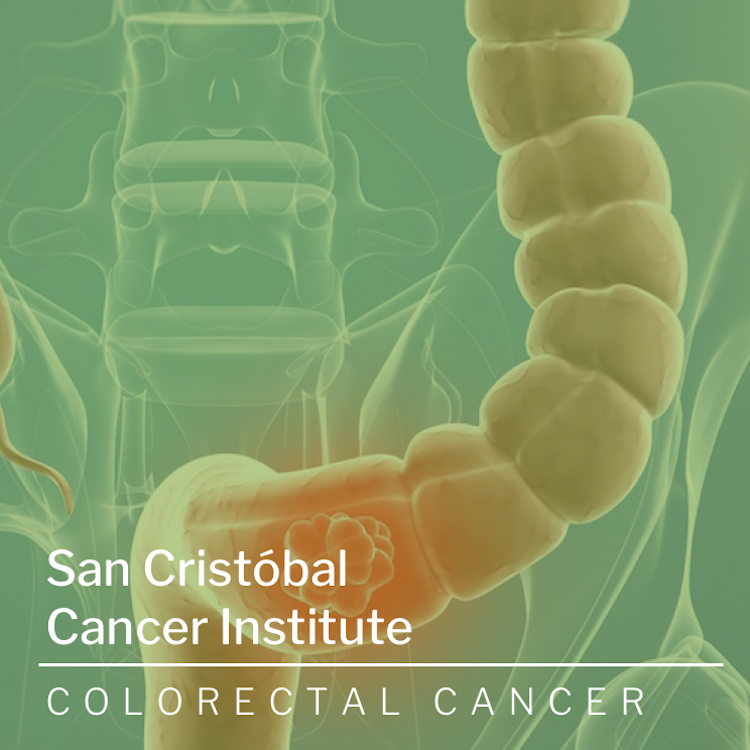
Colorectal Cancer Facts

Colorectal cancer is the second most common cancer diagnosed in Puerto Rico and the second most common cause of cancer deaths in the United States. Colorectal cancer can be curable when detected early; that’s why San Cristóbal Cancer Institute experts encourage adults 50 years of age or older to have regular tests to detect this type of cancer. And those people with higher risk of developing this type of cancer, must be tested before 50 years of age.
Overview
Colon cancer is cancer of the large intestine (colon), which is the final part of your digestive tract. Most cases of colon cancer begin as small, noncancerous (benign) clumps of cells called adenomatous polyps. Over time some of these polyps can become colon cancers.
Polyps may be small and produce few, if any, symptoms. For this reason, doctors recommend regular screening tests to help prevent colon cancer by identifying and removing polyps before they turn into cancer.
Symptoms
Signs and symptoms of colon cancer include:
- A change in your bowel habits, including diarrhea or constipation or a change in the consistency of your stool, that lasts longer than four weeks
- Rectal bleeding or blood in your stool
- Persistent abdominal discomfort, such as cramps, gas or pain
- A feeling that your bowel doesn’t empty completely
- Weakness or fatigue
- Unexplained weight loss
Many people with colon cancer experience no symptoms in the early stages of the disease. When symptoms appear, they’ll likely vary, depending on the cancer’s size and location in your large intestine. If you notice any symptoms of colon cancer, such as blood in your stool or an ongoing change in bowel habits, do not hesitate to make an appointment with your doctor.
Stages
Once you’ve been diagnosed with colon cancer, your doctor will order tests to determine the extent (stage) of your cancer. Staging helps determine what treatments are most appropriate for you. Staging tests may include imaging procedures such as abdominal, pelvic and chest CT scans. In many cases, the stage of your cancer may not be determined until after colon cancer surgery. The stages of colon cancer are:
- Stage I. The cancer has grown through the superficial lining (mucosa) of the colon or rectum but hasn’t spread beyond the colon wall or rectum.
- Stage II. The cancer has grown into or through the wall of the colon or rectum but hasn’t spread to nearby lymph nodes.
- Stage III. The cancer has invaded nearby lymph nodes but isn’t affecting other parts of your body yet.
- Stage IV. The cancer has spread to distant sites, such as other organs — for instance, to your liver or lung.
Treatment Options
The type of treatment your doctor recommends will depend largely on the stage of your cancer. The three primary treatment options are surgery, chemotherapy, and radiation.
Surgery for Early-Stage Colon Cancer: If your colon cancer is very small, your doctor may recommend a minimally invasive approach to surgery, such as:
- Removing Polyps During a Colonoscopy: If your cancer is small, localized and completely contained within a polyp and in a very early stage, your doctor may be able to remove it completely during a colonoscopy.
- Endoscopic Mucosal Resection: Removing larger polyps may require also taking a small amount of the lining of the colon or rectum in a procedure called an endoscopic mucosal resection.
- Minimally Invasive Surgery: Polyps that can’t be removed during a colonoscopy may be removed using laparoscopic surgery. In this procedure, your surgeon performs the operation through several small incisions in your abdominal wall, inserting instruments with attached cameras that display your colon on a video monitor. The surgeon may also take samples from lymph nodes in the area where the cancer is located.
Surgery for Invasive Colon Cancer: If cancer has grown into or through your colon, your surgeon may recommend:
- Partial Colectomy: During this procedure, the surgeon removes the part of your colon that contains the cancer, along with a margin of normal tissue on either side of cancer. Your surgeon is often able to reconnect the healthy portions of your colon or rectum. This procedure can commonly be done by a minimally invasive approach (laparoscopy).
- Surgery to Create a Way for Waste to Leave Your Body: When it’s not possible to reconnect the healthy portions of your colon or rectum, you may need an ostomy. This involves creating an opening in the wall of your abdomen from a portion of the remaining bowel for the elimination of stool into a bag that fits securely over the opening. Sometimes the ostomy is only temporary, allowing your colon or rectum time to heal after surgery. In some cases, however, the colostomy may be permanent.
- Lymph Node Removal: Nearby lymph nodes are usually also removed during colon cancer surgery and tested for cancer.
Surgery for Advanced Cancer: If your cancer is very advanced or your overall health very poor, your surgeon may recommend an operation to relieve a blockage of your colon or other conditions in order to improve your symptoms. This surgery isn’t done to cure cancer, but instead to relieve signs and symptoms, such as bleeding and pain.
Chemotherapy: This technique uses drugs to destroy cancer cells. Chemotherapy for colon cancer is usually given after surgery if the cancer has spread to lymph nodes. In this way, chemotherapy may help reduce the risk of cancer recurrence and death from cancer. Sometimes chemotherapy may be used before surgery as well, with the goal of shrinking the cancer before an operation. Chemotherapy before surgery is more common in rectal cancer than in colon cancer. Chemotherapy can also be given to relieve symptoms of colon cancer that has spread to other areas of the body.
Radiation Therapy: This technique uses high-powered beams of energy, such as X-rays and protons, to kill cancer cells. Radiation therapy is typically done using a large machine that aims the energy beams at your body (external beam radiation). San Cristóbal has one of the most sophisticated radiotherapy machines in Puerto Rico, which targets radiation efficiently to aggressively treat tumors without damaging surrounding organs.
Immunotherapy: Some patients with advanced colon cancer have a chance to benefit from immunotherapy with antibodies such as pembrolizumab (Keytruda) and nivolumab (Opdivo). Whether a colon cancer has the chance to respond to these immunotherapies can be determined by a specific test of the tumor tissue.
Palliative Care: Palliative care is specialized medical care that focuses on providing relief from pain and other symptoms of a serious illness. Palliative care specialists work with you, your family and your other doctors to provide an extra layer of support that complements your ongoing care. Palliative care can be used while undergoing other aggressive treatments, such as surgery, chemotherapy or radiation therapy. When palliative care is used along with all of the other appropriate treatments, people with cancer may feel better and live longer. Palliative care is provided by our skilled team of doctors, nurses and specially trained professionals, aimed at improving the quality of life for people with cancer and their families. This form of care is offered alongside curative or other treatments you may be receiving. Learn more about San Cristóbal Palliative Care.
Resources
San Cristobal Cancer Institute offers a wide array of options to help our patients feel calm and supported during the process of screening, diagnosis and treatment, as well as getting back to life after cancer. Browse our alternatives for patients – including financial aid for those eligible – in our Patient Resources section.
If you’d like to learn more about Colorectal Cancer through our San Cristóbal Education Resources, attend our events or learn about our Cancer Center, please contact us.
Knowledge is Power.
Education is one of our strongest tools at San Cristóbal Cancer Institute, empowering patients and their families with complete and updated information about more than a dozen types of cancer and providing first-hand knowledge through our dedicated team of cancer experts. If you’d like to know more, please get in touch with us. We look forward to offering you and your family powerful cancer awareness and the most comprehensive care.
